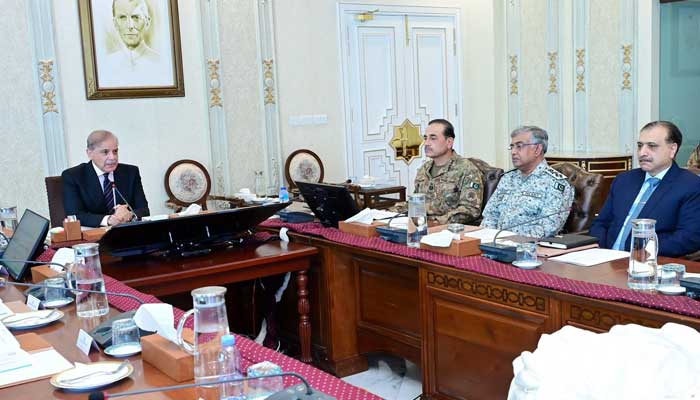ISLAMABAD: A critical meeting of Pakistan’s National Security Committee (NSC) began on Monday under the leadership of Prime Minister Shehbaz Sharif. The high-level session was held to examine the ongoing Israel-Iran war and its expected impact on regional peace and national stability.
According to inside sources, the conference brought together top military commanders, key federal ministers, and senior officials from defence and foreign affairs. The central topic of the meeting was the fast-developing situation in the Middle East, especially in light of the Israel-Iran War.
The participants discussed how this expanding conflict may affect Pakistan and the wider region. Particular focus was placed on the recent airstrikes carried out by the United States on Iran. Washington launched bunker-buster bombs and missiles, targeting three major Iranian nuclear sites in Fordow, Natanz, and Isfahan.
These attacks, carried out under orders from President Donald Trump, have added new fuel to the fire of the Israel-Iran War. The strikes mark a major shift, drawing the United States directly into the regional confrontation.
In a strong response, Pakistan condemned the U.S. decision to bomb Iran’s nuclear infrastructure. The Ministry of Foreign Affairs described the move as a violation of international law. The government emphasized that war is not the answer, and only diplomacy can resolve such dangerous tensions.
“The ongoing aggression against Iran and the resulting rise in violence is alarming,” said the official statement. “Any further escalation of this conflict will severely damage regional peace and global security.”
This meeting of the NSC was held just hours after Pakistan joined China and Russia in presenting a resolution at the United Nations Security Council. The draft resolution calls for an immediate and unconditional ceasefire in the Israel-Iran War.
The document also urges all sides to avoid further military action, protect civilians and key infrastructure, and commit to peaceful dialogue. It promotes a diplomatic solution for the Iranian nuclear issue that respects the concerns of all parties.
Pakistan’s Permanent Representative to the UN, Asim Iftikhar, spoke during the Security Council session. He urged the global community to push for peace through diplomacy. He stressed the need to follow international law and find a long-term solution to the Iranian nuclear crisis.
The NSC meeting signals that Pakistan is watching the Israel-Iran War with growing concern. With rising military activity in the region, Islamabad aims to stay prepared for any fallout that may affect its own security and economy. The situation remains tense, and further developments could reshape regional alliances and strategies.


